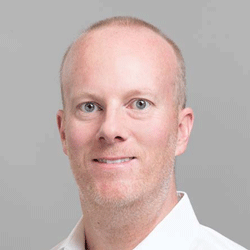The Problem
Traditional food production relies heavily on land and water, straining natural resources.
Traditional food production relies heavily on land and water, straining natural resources.
Convert CO₂ into acetate to replace sugar as a feedstock for producing protein-rich foods through fermentation.
This approach could enable scalable, sustainable food production that reduces environmental impact and helps feed a growing global population.
Professor Ted Sargent
Northwestern Engineering’s Ted Sargent and his research group are part of an international consortium working to develop food production methods based on carbon dioxide. The initiative, called the Acetate Consortium, has been renewed and expanded with funding from the Gates Foundation and the Novo Nordisk Foundation.

Launched in 2023, the consortium is developing a platform that converts CO₂ into acetate. The acetate replaces sugar as the feedstock in fermentation processes, enabling the production of single-cell and precision proteins. The goal is to establish scalable and financially viable production of nutritious food that does not depend on agricultural land, thereby reducing land and water use.
“This consortium pursues an ambitious vision the goal of increasing food security in a world in which agricultural productivity is impacted by climate change – a priority made all the more urgent by growth in population and global demand for nutritious food,” said Sargent, the Lynn Hopton Davis and Greg Davis Professor of Chemistry at the Weinberg College of Arts and Sciences, professor of electrical and computer engineering at the McCormick School of Engineering, and director of the Paula M. Trienens Institute for Sustainability and Energy. “It is a privilege to contribute to this international partnership of the highest order.”
Ted SargentLynn Hopton Davis and Greg Davis Professor of Chemistry, Professor of Electrical and Computer Engineering
In its first two years, the Acetate Consortium developed microbial strains that grow on 100 percent acetate and contain more than 40 percent protein. Pilot facilities were built at Aarhus University in Denmark to demonstrate acetate production, and key cost drivers such as electricity and infrastructure were identified.
With funding renewed through 2027, the consortium will now focus on scaling the technology and developing food prototypes for testing. The work will also include socio-economic and environmental modeling to evaluate the impact of the technology. New partners in food science, consumer behavior, and gastronomy will contribute expertise as the project enters this second phase.
“We need tangible solutions that can feed more people without putting pressure on our natural resources and enabling food production in areas that have very little or no agricultural land,” said Claus Felby, vice president for agri-food at the Novo Nordisk Foundation. “When the consortium began its work two years ago, making food derived from CO2 seemed like something taken from a science fiction movie. Within the next two years, we can expect to see actual prototypes of food products that will be tested by consumers. The collaboration in the consortium is a good example of what we can achieve with biosolutions when researchers and companies combine their strengths and work towards a clear common goal.”
Along with Northwestern, the consortium partners are:
The renewed initiative includes funding of up to $25.7 million over two years. The Gates Foundation and the Novo Nordisk Foundation are providing equal support. The Gates Foundation is funding activities at Northwestern, Novonesis A/S, and Copenhagen Process ApS; while the Novo Nordisk Foundation is funding the remaining partners.
Established in Denmark in 1924, the Novo Nordisk Foundation is an enterprise foundation with philanthropic objectives. The Foundation’s vision is to improve people’s health and the sustainability of society and the planet. Its mission is to progress research and innovation in the prevention and treatment of cardiometabolic and infectious diseases as well as to advance knowledge and solutions to support a green transformation of society.
The Gates Foundation works to help all people lead healthy, productive lives. In developing countries, the foundation works with partners to create impactful solutions so that people can take charge of their futures and achieve their full potential. In the United States, the foundation aims to ensure that everyone—especially those with the fewest resources—has access to the opportunities needed to succeed in school and life.